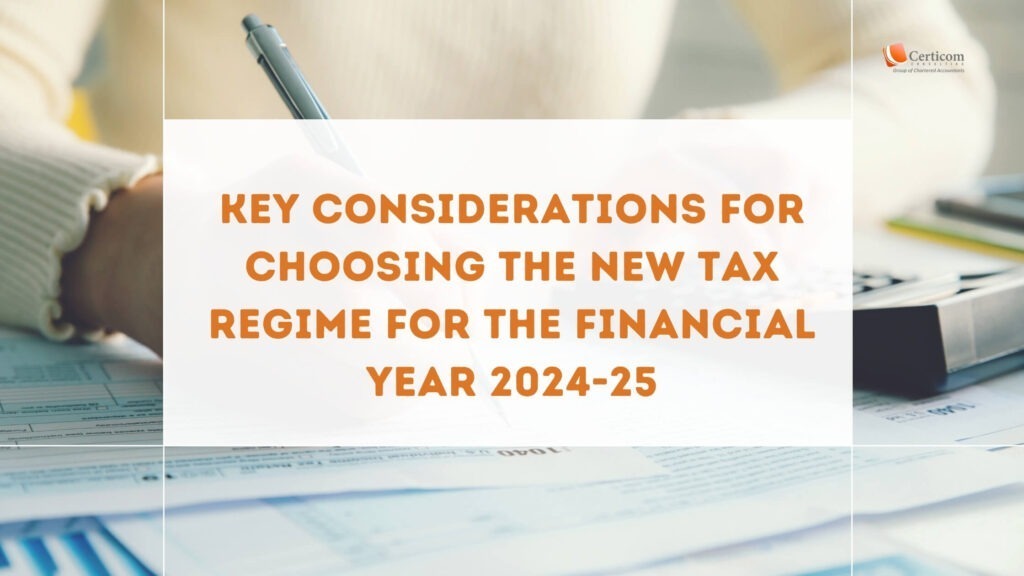Key Considerations for Choosing the New Tax Regime for the Financial Year 2024-25

Finance Minister Nirmala Sitharaman announced in the Union Budget 2023 that the new income tax system will take effect on April 1, 2023, by default. The minister did note that taxpayers are still able to utilize the previous system. The default option for all taxpayers, including individuals, Hindu Undivided Families (HUFs), and Association of Persons (AOPs), is the new tax regime that was implemented in the Union Budget 2020.
Concessional tax rates were available under the new tax regime, which featured modified tax slabs that differed slightly from the previous tax regime.
When selecting the new tax regime, keep the following points in mind:

Income Tax Rebate:
Individuals with annual incomes up to Rs 5 lakh were exempt from paying any taxes prior to the Union Budget 2023. This cap was increased to Rs 7 lakh. The rebate amount was increased by Rs 12,500 under the new tax scheme, from Rs 12,500 previously.
Standard deduction under New Tax Regime
In the Union Budget 2023, the standard deduction of Rs 50,000—previously limited to the Old Tax Regime—was expanded to include the new tax regime. The tax-free income, including the rebate, is now Rs 7.5 lakh as a result of the inclusion.
Revised tax slabs
The New Tax Regime offers lower tax rates than the Old Tax Regime, which is one of its main differences. In its 2023 Budget, the government revealed new income tax slabs. The new tax system offers lower tax rates, larger tax slabs, and a greater threshold for tax relief.
These are the updated tax slabs that were included in the 2023 Union Budget.
Zero tax on income up to Rs 3 lakh
5% between Rs 3 lakh and Rs 6 lakh
10% on Rs 6 lakh to Rs 9 lakh
15% on Rs 9 lakh to Rs 12 lakh
20% on Rs 12-15 lakh
30% on Rs 15 lakh
Reduced Surcharge for High Net Worth Individuals
The surcharge rate on income above Rs 5 crores was lowered by FM Sitharaman from 37% to 25%. The effective tax rate was reduced by this action from 42.74% to 39%. This was only implemented as part of the New Tax Regime.
Prior to this, under both the Old and New Tax regimes, the surcharge—the tax on tax for individuals with income above Rs 5 crore—was 37% of the total tax amount. Due to this, the maximum marginal tax rate (including the surcharge) was raised to 42.74%, the highest level of taxation seen in the previous thirty years.
Surcharge Rates for Individual/HUF/AOP/BOI/ Artificial Judicial Person
Higher Leave Encashment Exemption
FM Sitharaman raised the leave encashment amount claimed as exemption to Rs 25 lakh from Rs 3 lakh for non-government employees, which is nearly an eight-fold increase, citing a general wage increase.

There are benefits and drawbacks to both the new and the old tax systems. It should be noted that some exemptions and deductions, like HRA, LTA, 80C, 80D, and others, are not available under the New Tax System. For people who would rather take few deductions or don’t want to deal with the hassle of complicated tax planning, the New Income Tax Regime is suitable.
The Old Tax Regime, on the other hand, is appropriate for people who save regularly and have investments in tax-saving options.
Related Post
Foreign Tax Credit in India: A Guide for NRIs
Top 10 Tax Filing Rules for FY 2024-25
Book A One To One Consultation Now For FREE
How can we help? *




